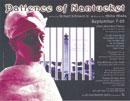Astute and engaging, Robert Johnson Jr. is a professional and artistic asset to both UMass Boston and the wider community. Johnson’s work as Chair Professor of the Africana Studies Department at UMB led him to his current project, the production of his play.
Patience of Nantucket is onstage at the Plaza Black Box Theatre at Boston Center for the Arts through September 23. Patience opened on Sept 7 to a sold out show of UMB alumni, followed by a weekend of nearly sold out public shows. (“Only about one or two seats were not sold.”). So far, reviews around Boston have been good.
Patience of Nantucket began as a research concept and developed over the course of ten years.
“It started off as a research project under The James Bradford Ames Fellowship Program initiated by Adell Ames eleven years ago. She wanted to establish a fellowship program that would research the history of Blacks and Cape Verdeans in Nantucket in memory of her husband James Bradford Ames.”
As coordinator of the program Johnson went to Nantucket for research and states, “I discovered some court records on Patience Cooper and decided I’d first do a scholarly article and write a play.”
Patience of Nantucket is a dramatization of the life of Patience Cooper, an African-American woman, who was wrongfully convicted of killing a white shopkeeper in nineteenth century Nantucket. During her trial she’s railroaded in a racial witch-hunt that shakes up and tears apart the tiny island. A secret love affair as well as tensions between the Quakers and segregationists on the island provide background that moves the action forward.
“Patience represents the great lengths some people will go to for control and their beliefs,” says Johnson, describing his antagonist, her accuser. Who’s an avid segregationist with local clout. His [racist] motive for implicating and accusing Patience are undeniable. Johnson explains that on the other hand, this play represents the power and strength in community seen through the togetherness of African Americans on Nantucket, the religious connectedness of the Quakers who stood by Patience Cooper through her adversity. Inevitably, it seems, justice is not achieved and Patience falls into insanity from her torturous turmoils, making the play a classic tragedy. “Patience occurs in 1860…the War was raging in the South, but in Nantucket a war on a smaller scale was happening. Who’s to say which one is worse?” Although he knows his play will never rectify the historical injustice of Patience Cooper’s time or her suffering, Professor Johnson has used his abilities to honor her memory and name.
Patience of Nantucket is produced through the Theatre Company “Up You Mighty Race” (The name derives from Marcus Garvey’s quote, “Up you mighty race; you can accomplish what you will.”) The theatre company’s founder is UMB Theatre/Psychology student Akiba Abaka, whom Johnson praises for her accomplishments at such a young age. UYMR started in Dorchester and Roxbury and has grown to its current height in just six years. Two of the actors in the production are UMB alumni: Mark Bourbeau as Attorney Marston and John Lee Baker Bay as Rev. James Crawford. Patience of Nantucket is an important experience for the UMB community as a way to support the artistry of every facet of UMB: a professor’s, a student’s, and two alumni’s artistic pursuits are rolled into one project.
“Drama can be used as a vehicle to make history more accessible to the community. It is very important for oppressed communities to understand their past because through that understanding they can gain both the focus andstrength necessaryto chart the demise of their oppression. Also, community theatre is more accessible. The ticket prices are cheaper and the plays speak more directly to the experiences of the poor and dispossessed of our society,” Johnson states. He is working on a future project in honor of his mother: another play about issues surrounding the Black Church and women’s struggles with sexual harassment. He is the editor and contributing writer of “Nantucket’s People of Color: Essays on History, Politics, and Community” which hits shelves this week.
“I have a lot in common with UMB students. Many of my students are first generation college students. I was a first generation college student. They truly want to succeed and work hard.” Regarding the balancing act many UMB students attempt with school, work, and financial responsibilities, Johnson tells his students “it’s harder being a UMB student than being a student at Harvard.”
To allow more UMB students to attend the production, the theater has lowered prices for students with valid UMB ID to $10.50; a great deal.

